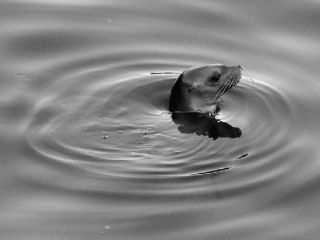With the seal pup birthing season near, harbor seals are hauling out of the water and onto Puget Sound shores, and beach-goers are warned to give them plenty of space.
Harbor seals are vulnerable on land and are therefore wary of being approached out of water, Susan Berta, coordinator for the Central Puget Sound Marine Stranding Network, said.
Adult seals will escape to the water more quickly than pups. Females will flee if approached and may leave their pups behind.
Seals will reclaim pups if the disturbance near the pup goes away. If it continues, the female may eventually give up trying to return.
“A nursing pup that is separated from its mother will not survive,” Berta said.
Contact with seals can put humans at risk for diseases transferred by marine mammals. Recently, a person tried to move a pup from the beach and was scratched.
Bites may result in an infection called seal finger. It can cause cellulitis, debilitating joint inflammation and edema of the bone marrow.
The Marine Stranding Network will post permanent warning signs in state parks in upcoming weeks. The seals are federally protected and the penalty for harassing or capturing the mammals is a fine of up to $100,000 and/or a year in prison.
Feeding or baiting a seal in the wild is a form of harassment and teaches seals to seek out humans for food. People should avoid handling, covering or pouring water on seal pups, Berta said.
Viewing guidelines from the National Marine Fisheries Service recommends a minimum approach distance of 100 yards. If you want to see an animal close up, Berta recommends observing from a distance using binoculars.
Older seals may bite in defense, so dogs should be leashed to avoid any injurious interaction. By law, dogs must be on a leash in Island County when off the owner’s property.
In sites on west Whidbey and the San Juans, pups are born from late June through August. They stay with their mothers for about four to six weeks and then are weaned to forage on their own.
If you notice a pup has been unattended for 48 hours or if it is clearly injured, contact the Marine Standing Network at 1-866-ORCANET.




